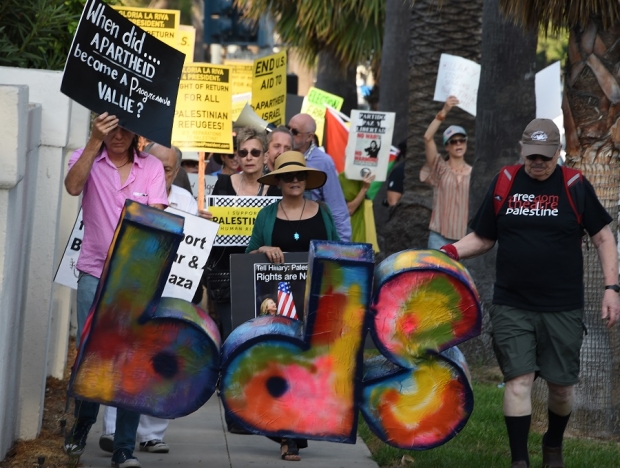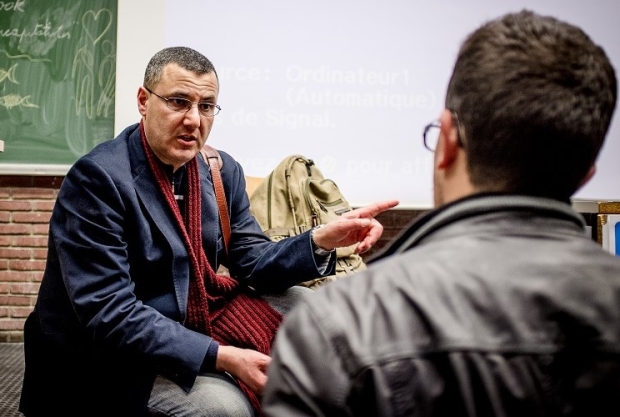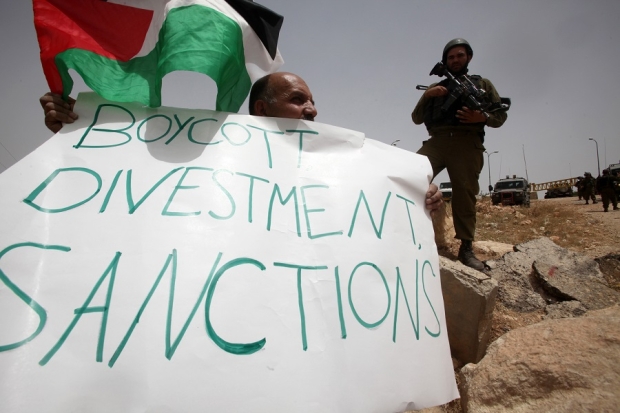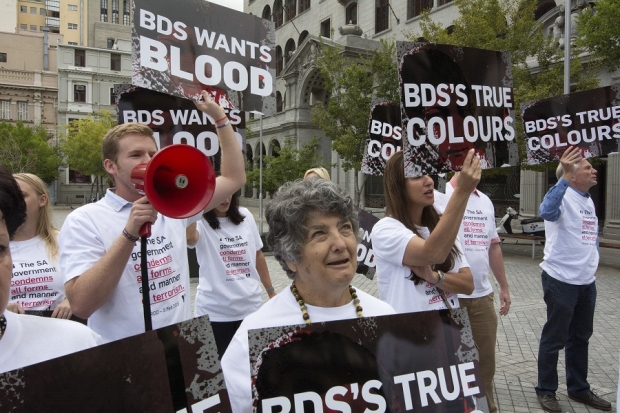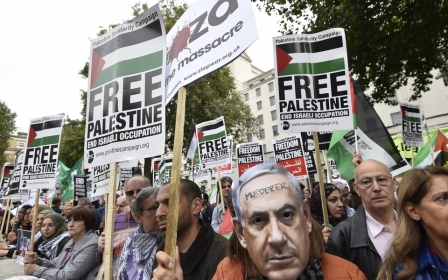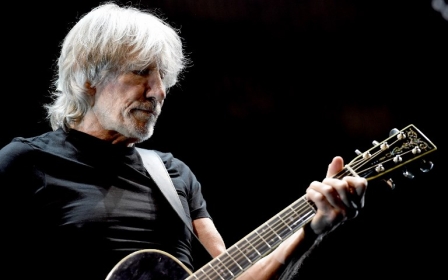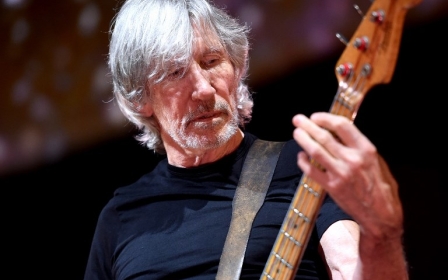BDS co-founder Omar Barghouti: 'We lose some battles, but we win most'
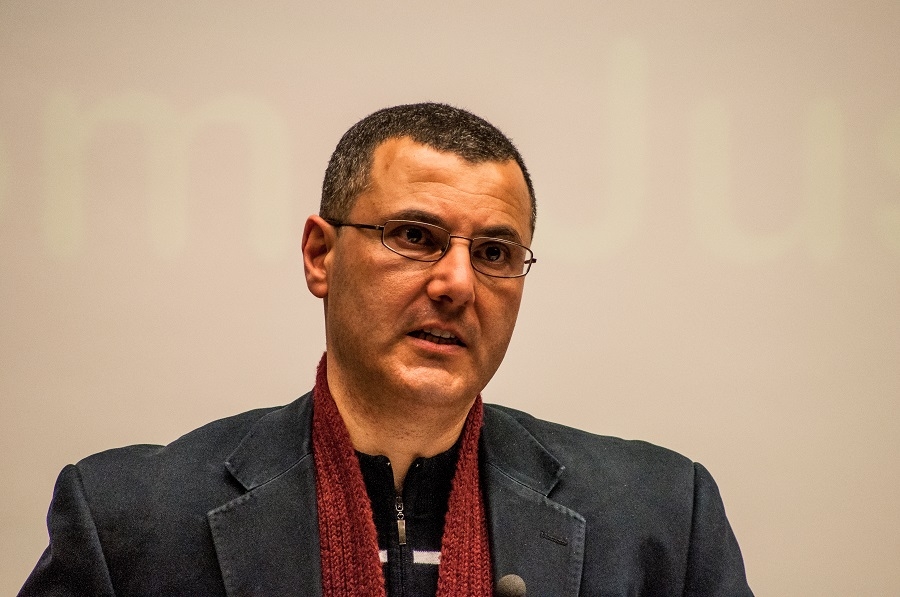
Last week, Israel’s Knesset passed a preliminary vote on a bill that will allow Israelis to sue individuals and groups calling for a boycott of the country’s settlements. Under the legislation, the claimant does not need to prove precise damages and compensation could reach up to 500,000 shekels ($142,842).
According to media reports, Yoav Kish, the Knesset member who submitted the proposal for the bill, said that Omar Barghouti, a Palestinian human rights activist, author, and co-founder of the Boycott, Divestment and Sanctions movement (BDS), who is a permanent resident of Israel, could be sued under the new law.
Barghouti though, sees this as a sign that the global campaign to boycott Israel has gained so much traction, its opponents have resorted to “desperate measures” to hinder its progress.
The proposed bill is the latest in a raft of motions in Israel, the US and beyond designed to diminish the impact of the BDS movement.
BDS, which defines itself as a movement that "works to end international support for Israel's oppression of Palestinians and pressure Israel to comply with international law," has increasingly been in the spotlight as it faces scrutiny from detractors spanning state legislators in the US to student activists in Austria.
That scrutiny, Barghouti says, is a consequence of BDS’s many successes and it has not dented his optimism. If anything, the campaign is on track to meet its goals, the BDS founder maintains.
Campus controversies
While Barghouti was in the UK earlier this month to speak at the London School of Economics (LSE) and the University of Cambridge, student activists accused both Universities of censoring events featuring the BDS founder.
According to the students, Cambridge University allegedly threatened to ban the event unless the organisers removed its chair, Palestinian academic Ruba Salih, citing concerns over her neutrality. Salih, who teaches at the School of Oriental and African Studies (SOAS), was then replaced with Paul Mylrea, the university’s director of communications.
During a separate event on the BDS movement, the LSE told academics hosting the meeting to replace the advertised chairwoman, Ayca Cubukcu, a Turkish academic who specialises in the Middle East, with an "independent" university appointee.
Cubukcu was replaced by Eric Neumayer, a professor from the LSE's geography department.
BDS is, at its core, an intersectional campaign that “reconnects the Palestinian freedom struggle with international struggles for racial, indigenous, economic, gender, social and climate justice
- Omar Barghouti, BDS co-founder
Multiple student unions in the UK - including the National Union of Students, an umbrella organisation - have indeed backed BDS-related motions. The student union of London’s SOAS was one of the first in the country to endorse BDS. Student unions at King’s College London, Manchester University, University College London, and Liverpool University have adopted similar resolutions, among others.
As student unions are registered charities in the UK, they have a legal obligation to support the views of their members.
Some universities have distanced themselves from the BDS motions by saying that student unions are distinct entities from the schools themselves. The Charity Commission is reportedly investigating whether the student unions are breaking the law by supporting BDS.
In the US, student councils at UCLA, Stanford, and UC Berkeley have adopted various divestment resolutions against companies affiliated with Israeli military occupation and settlements.
On the other hand, in the past three weeks alone, student leaders at the University of Maryland and the University of Ottawa in Canada have rejected motions to support boycotts of Israel. Activists claim the adoption of BDS would “harm Jews and Israelis” and set a negative precedent for groups facing discrimination in the US and Canada.
Various forms of anti-BDS legislation have also been debated or enacted in the US. For example, Texas Governor Greg Abbott in May passed a bill forbidding state entities from working with firms that boycott Israel.
In October, The American Civil Liberties Union filed a federal lawsuit against the state of Kansas, arguing that an anti-BDS law breached the first amendment.
The Balfour Declaration
Barghouti's visit to the UK earlier this month coincided with the 100-year anniversary of the Balfour Declaration, the agreement which facilitated the creation of the state of Israel and triggered the Palestinian exodus.
“The Palestinian people expect the UK to atone for its role in the Zionist destruction of Palestine, ethnic cleansing of the indigenous Palestinians,” Barghouti says. “Apologies aside, the UK must end its deep complicity in Israel's crimes and human rights violations against the Palestinian people."
The Palestinian people expect the UK to atone for its role in the Zionist destruction of Palestine, ethnic cleansing of the indigenous Palestinians
- Omar Barghouti, BDS co-founder
“At the very least, it should stop its arms trade and military research with Israel, ban the import of products from Israeli and international companies implicated in Israel's military occupation and apartheid, and end British companies' and institutions' complicity in these violations.”
The UK’s Department for Communities and Local Government has attempted to ban “inappropriate” boycotts by councils and town halls to prevent them “from introducing restrictions on the companies and countries they use – particularly by introducing boycotts on goods from Israel”. A spokesperson for Labour leader Jeremy Corbyn last year described the move as an attack on local democracy. In June, the UK High Court ruled that efforts to restrict "ethical" boycotts of Israel were unlawful.
Meanwhile, on 2 November, Theresa May dined with Israel's prime minister Benjamin Netanyahu along with a host of dignitaries to celebrate the anniversary of the Balfour declaration, saying Britain is “proud” of its “pioneering role in the creation of the state of Israel”.
‘Going up’
“BDS, like all human rights and social movements, does not follow a linear progress path,” Barghouti says. “We lose some battles, but we win most, so the general direction is going up.”
Some of the latest wins for BDS include Danish pension fund Sampension’s decision to blacklist four Israeli companies that offer a variety of services in the settlements including banking, construction and telecommunications, in addition to India’s largest farmers’ organisation joining the movement.
British film director Ken Loach is donating proceeds from Israel’s screenings of his award-winning film, I Daniel Blake, to Palestinian grassroots organisations.
[The UK] should stop its arms trade and military research with Israel, ban the import of products of Israeli and international companies implicated in Israel's military occupation and apartheid
- Omar Barghouti, BDS co-founder
Among the countries whose politicians have expressed support for BDS, which was founded as a collective in 2005 and is modelled around South Africa’s struggle against Apartheid, are Chile, Bolivia, Venezuela and South Africa, among others.
“This impressive growth of BDS worldwide explains why Israel has a whole ministry dedicated to fighting the movement and is allocating massive financial and human resources in its war” on it, Barghouti says.
‘Remarkable battles’
Israel has indeed been stepping up efforts against BDS. On 14 November, the strategic affairs minister, Gilad Erdan, said that the state is moving from “defence to offence” on the BDS campaign, commenting on Israel’s decision to deny entry to seven members of a delegation of European officials that support the campaign.
The move was rooted in a law enacted this year that imposes a travel ban on anti-Israel boycott activists to Israel.
In October, Amnesty International’s US advocacy director for the Middle East, Raed Jarrar, was forbidden from entering the occupied West Bank via Jordan to visit family members, following his father’s death.
Amnesty had criticised a law passed by the Knesset in 2011 that made it an offence to call for a boycott against Israel or its settlements, saying the legislation would “have a chilling effect on freedom of expression in Israel”.
Israel and its lobby groups have resorted to repressive, desperate and possibly illegal measures of legal warfare to stifle the [BDS] movement
- Omar Barghouti, BDS co-founder
In 2016, Netanyahu told a UN summit that “BDS has nothing to do with human rights, nothing to do with justice."
“The reason we should fight BDS is because it’s wrong; it’s a moral outrage," he added.
For anti-BDS activists who have led the push for some of these legislative measures, they often say BDS promotes “hate”.
To these critics, Barghouti responds: “BDS is anchored in the Universal Declaration of Human Rights. It is an inclusive movement that adopts a robust anti-racist platform and promotes freedom, justice, and equality."
“Human rights defenders only ‘hate’ injustice, oppression, apartheid, and other forms of denial of rights," he adds.
Intersectionality
According to Barghouti, BDS is, at its core, an intersectional campaign that “reconnects the Palestinian freedom struggle with international struggles for racial, indigenous, economic, gender, social and climate justice”.
“The intersectionality of the Palestinian struggle for justice with other justice struggles around the world in light of the rising xenophobic, racist far-right in the era of Donald Trump, Marine Le Pen, Netanyahu and others," is particularly pertinent and timely, Barghouti says.
BDS supporters are indeed wide-ranging. The campaign lists pension funds, churches, trade unions, academic associations, social movements and LGBTQ groups as supporters or endorsers. In 2016, the Black Lives Matter Movement endorsed BDS on its policy platform, criticising the US for providing military aid to Israel.
BDS supporters and members of the US Campaign for Palestinian Rights have in turn expressed solidarity with civil rights struggles in the US.
Both communities came together to make the spoken-word video When I See Them I See Us, which featured Angela Davis, Lauryn Hill and various black and Palestinian artists, and it went viral.
Notable public figures including writers Arundhati Roy, Junot Diaz and Naomi Klein, philosopher Judith Butler and Nobel Laureate Desmond Tutu have thrown their celebrity weight and intellectual prowess behind the campaign.
At two very different ends of the cultural boycott debate are Radiohead and Roger Waters of Pink Floyd. When Radiohead performed in Tel Aviv in July, rejecting BDS’s calls to boycott the state, it was met with scrutiny by supporters of the campaign and enthusiasm in Israel.
According to Variety, one Israeli newspaper encouraged concert-goers to wave Israeli flags in a show of support for the state.
Radiohead’s frontman argued at the time that “playing in a country isn’t the same as endorsing its government".
Meanwhile, Waters has consistently maintained support for BDS despite being slammed by some of his peers, saying that “it’s the only thing that I’ve seen that’s had any effect at all”.
A cultural and academic boycott, in addition to an economic one, is necessary, Barghouti says, because it highlights “the pernicious role that Israel's academic and to a lesser extent cultural institutions play in planning, implementing, justifying or whitewashing its egregious crimes against the Palestinian people".
New MEE newsletter: Jerusalem Dispatch
Sign up to get the latest insights and analysis on Israel-Palestine, alongside Turkey Unpacked and other MEE newsletters
Middle East Eye delivers independent and unrivalled coverage and analysis of the Middle East, North Africa and beyond. To learn more about republishing this content and the associated fees, please fill out this form. More about MEE can be found here.


